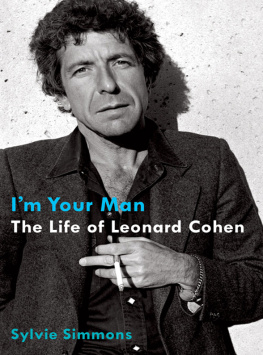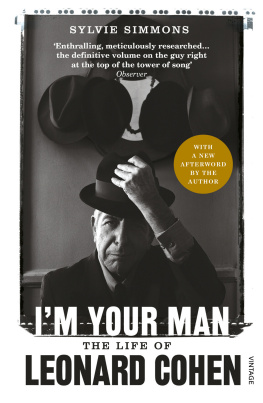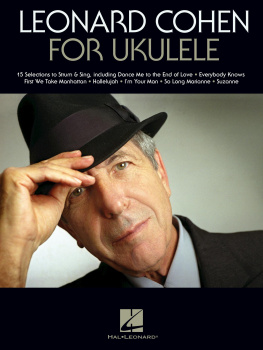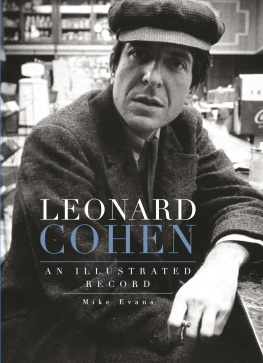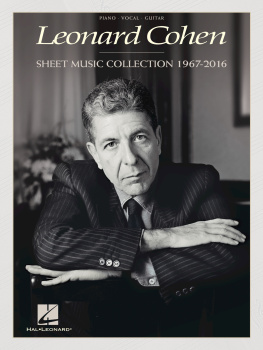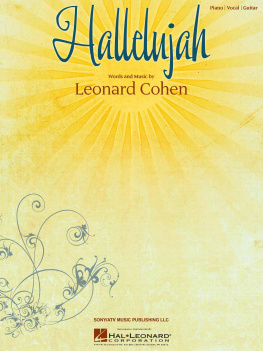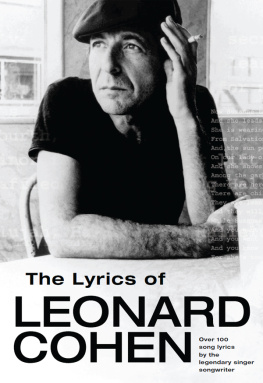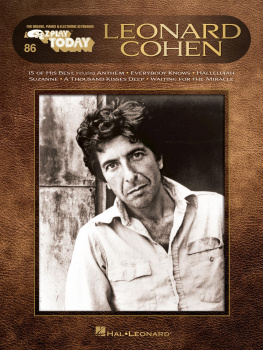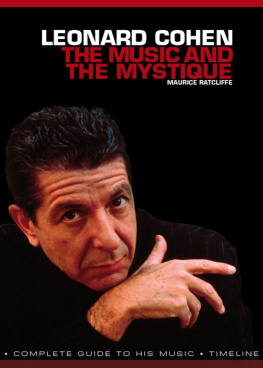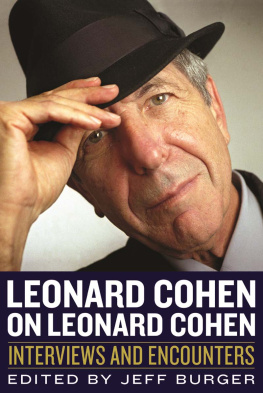Im Your Man
The Life of Leonard Cohen
Sylvie Simmons

To N.A., in loving memory
The way you do anything is the way you do everything.
T OM W AITS
Contents
H e is a courtly man, elegant, with old-world manners. He bows when he meets you, stands when you leave, makes sure that youre comfortable and makes no mention of the fact hes not; the discreet stroking of the Greek worry beads he carries in his pocket gives the game away. By inclination he is a private man, rather shy, but if probing is required hell put his feet in the stirrups with dignity and humor. He chooses his words carefully, like a poet, or a politician, with a habit of precision, an ear for their sound, and a talent and a taste for deflection and mystery. He has always liked smoke and mirrors. And yet there is something conspiratorial in the way he talks, as there is when he sings, as if he were imparting an intimate secret.
He is a trim mantheres no excess to him at alland smaller than you might think. Shipshape. You imagine that he wouldnt find it hard to wear a uniform. Right now he is wearing a suit. It is dark, pin-striped, double-breasted, and if its off-the-rack it doesnt look it.
Darling, says Leonard, I was born in a suit.
When Im with you
I want to be the kind of hero
I wanted to be
when I was seven years old
a perfect man
who kills
The Reason I Write, Selected Poems 19561968
T he chauffeur turned off the main road by the synagogue, which took up most of the block, and headed past St. Matthiass Church on the opposite corner, and up the hill. In the back of the car was a womantwenty-seven years old, attractive, strong featured, stylishly dressedand her newborn baby son. The streets they passed were handsome and well-appointed, the trees arranged just so. Big houses of brick and stone you might have thought would collapse under the sheer weight of their self-importance appeared to float effortlessly up the slopes. Around halfway up, the driver took a side road and stopped outside a house at the end of the street, 599 Belmont Avenue. It was large, solid and formal-looking, English in style, its dark brick softened by a white-framed veranda at the front and at the back by Murray Hill Park, fourteen acres of lawns, trees and flower beds, with a sweeping view of the St. Lawrence River to one side and, on the other, downtown Montreal. The chauffeur stepped out of the car and opened the rear door, and Leonard was carried up the white front steps and into his family home.
Leonard Norman Cohen was born on September 21, 1934, in the Royal Victoria Hospital, a gray stone pile in Westmount, an affluent neighborhood of Montreal, Canada. According to the records, it was at six forty-five on a Friday morning. According to history, it was halfway between the Great Depression and World War II. Counting backward, Leonard was conceived between the end of Hanukkah and Christmas Day during one of the subarctic winters his hometown managed to deliver with both consistency and brio. He was raised in a house of suits.
Nathan Cohen, Leonards father, was a prosperous Canadian Jew with a high-end clothing business. The Freedman Company was known for its formal wear, and Nathan liked to dress formally, even on informal occasions. In suits, as in houses, he favored the formal English style, which he wore with spats and tempered with a boutonniere and, when his bad health made it necessary, with a silver cane. Masha Cohen, Leonards mother, was sixteen years younger than her husband, a Russian Jew, a rabbis daughter and a recent immigrant to Canada. She and Nathan had married not long after her arrival in Montreal in 1927. Two years later she gave birth to the first of their two children, Leonards sister, Esther.
Early photographs of Nathan and Masha show him to be a square-faced, square-shouldered, stocky man. Masha, slimmer and a head taller, is in contrast all circles and slopes. The expression on Mashas face is both girlish and regal, while Nathans is rigid and taciturn. Even were this not the required camera pose for the head of a household at that time, Nathan was certainly more reserved, and more Anglicized, than his warm, emotional Russian wife. As a baby, Leonard, plump, compact and also square-faced, was the image of his father, but as he grew he took on his mother Mashas heart-shaped face, thick wavy hair and deep, dark, sloping eyes. From his father he acquired his height, his tidiness, his decency and his love of suits. From his mother he inherited her charisma, her melancholy and her music. Masha always sang as she went about the house, in Russian and Yiddish more than in English, the sentimental old folk songs she had learned as a child. In a good contralto voice, to imaginary violins, Masha would sing herself from joy to melancholy and back again. Chekhovian is how Leonard described his mother. said Leonard, one emotion following the other in quick succession. Masha Cohen was not a nostalgic woman; she did not talk much about the country she had left. But she carried her past in songs.
The residents of Westmount were well-to-do, upper-middle-class Protestant English Canadians and second- or third-generation Canadian Jews. In a city that was all about division and separation, the Jews and Protestants had been filed together on the simple grounds of being neither French nor Catholic. Before the Quiet Revolution in Quebec in the sixties, and before French became the sole official language of the province, the only French in Westmount were the domestic help. The Cohens had a maid, Mary, although she was Irish Catholic. They also had a nanny, whom Leonard and his sister called Nursie, and a gardener named Kerry, a black man, who doubled as the family chauffeur. (Kerrys brother held the same job with Nathans younger brother Horace.) It is no secret that Leonards background was privileged. Leonard has never denied being born on the right side of the tracks, has never renounced his upbringing, rejected his family, changed his name or pretended to be anything other than who he is. His family was well-off, although there were certainly wealthier families in Westmount. Unlike the mansions of Upper Belmont, the Cohens house, though big, was semidetached, and their car, though chauffeur driven, was a Pontiac, not a Cadillac.
But what the Cohens had that very few others came close to matching was status. The family Leonard was born into was distinguished and importantone of the most prominent Jewish families in Montreal. Leonards ancestors had built synagogues and founded newspapers in Canada. They had funded and presided over a lengthy list of Jewish philanthropic societies and associations. Leonards great-grandfather Lazarus Cohen had been the first of the family to come to Canada. In Lithuania, which was part of Russia in the 1840s, when Lazarus was born, Lazarus had been a teacher in a rabbinical school in Wylkowyski, one of the most rigorous yeshivas in the country. In his twenties, he left his wife and their baby son behind to try for his fortune. After a brief stay in Scotland, he took a ship to Canada, stopping in Ontario in a small town called Maberly, where he worked his way up from lumber storeman to the owner of a coal company, L. Cohen and Son. The son was Lyon, Nathans father, whom Lazarus sent for, along with his mother, two years later. The family eventually made their way to Montreal, where Lazarus became president of a brass foundry and started a successful dredging company.
When Lazarus Cohen first arrived in Canada in 1860, the countrys Jewish population was tiny. In the middle of the nineteenth century there had been fewer than five hundred Jews in Montreal. By the mid-1880s, when Lazarus assumed the presidency of the synagogue Congregation Shaar Hashomayim, there were more than five thousand. The Russian pogroms had led to a wave of immigration, and by the end of the century the number of Jews in Canada had doubled. Montreal had become the seat of Canadian Jewry, and Lazarus, with his long, white, biblical beard and uncovered head, was a familiar figure among its community. Along with building a synagogue, Lazarus established and headed a number of organizations to aid Jewish settlers and would-be immigrants, even traveling to Palestine (where Lazarus bought land as early as 1884) on behalf of the Jewish Colonization Association of Montreal. Lazaruss younger brother Rabbi Tzvi Hirsch Cohen, who joined him in Canada soon after, would become chief rabbi of Montreal.
Next page
